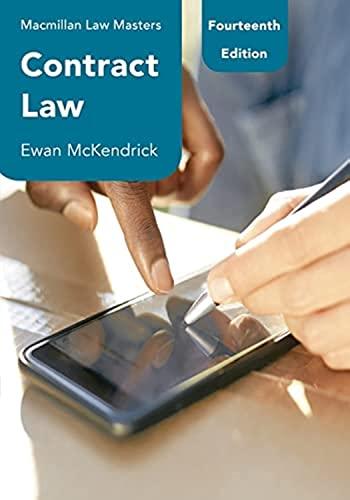Question
Directions: Read the cases below, and based on what we have learned in class about the First Amendment, state how you believe that the Supreme
Directions: Read the cases below, and based on what we have learned in class about the First Amendment, state how you believe that the Supreme Court should rule in the case. Justify your response with reasoning based on the First Amendment.
Brandenburg v. Ohio(1964)
Clarence Brandenburg, a Ku Klux Klan leader in Ohio, was arrested for advocating violence under an Ohio State law after a speech he made at a KKK rally in 1964. In the speech, Brandenburg made reference to the possibility of, "revengeance [sic] against niggers, jews," and those who supported them. He went on to claim that, "our President, our Congress, and our Supreme Court continues to suppress the white, Caucasian race." He then announced plans for a march on Washington to take place on the Fourth of July. The rally also included a cross burning. He was fined $1000 and sentenced to one to ten years in prison. He challenged his conviction claiming that the arrest was a violation of his First Amendment right to freedom of speech.
Decision:
Collin v. Smith(1978)
The National Socialist Party of America (Nazis) had a small membership in Chicago, IL led by Frank Collin. In order to recruit new members, Collin planned a series of marches and protests in 1977, one to be held in Skokie, IL, a suburb of Chicago. Of the 70,000 residents of Skokie, more than half were Jewish, and many had survived the concentration camps of World War II. Believing that seeing Nazi marchers in the streets and swastikas was bound to bring back tragic memories the town of Skokie attempted to get an injunction preventing the march. When that failed, the town passed a law requiring a $300,000 deposit for liability and property insurance for any group wishing to stage a public demonstration, knowing that the Nazi party could not afford such a fee. The law also forbids the wearing of military style uniforms at public demonstrations and the distribution of racist materials. The Nazis then took the town of Skokie to court claiming that this violated their right to assemble and freedom of speech.
Decision:
Morse v. Frederick(2007)
On January 24, 2002 students at Douglas High School in Juneau, Alaska were permitted to leave classes and go outside to watch the Olympic torch pass by. Joseph Frederick was late for school that day and joined his friends across the street from the school during the parade. When the torch and cameras passed by their location, Frederick and his friends unfurled a banner that read 'Bong Hits 4 Jesus.' The principal (Morse) hurried across the street and confiscated the banner. Frederick was suspended for ten days for violating the school's anti-drug policy. Frederick sued the school district claiming that his suspension was a violation of his freedom of speech. He went on to claim that he was not in the school building, and that on a public street, officials had no right to violate his first amendment rights. School officials claimed that the parade was a school sanctioned event and that the banner's pro drug message was disruptive to the schools policies.
Decision:
Texas v. Johnson (1989)
Gregory Johnson was participating in a protest in Dallas, Texas in 1984 after Ronald Reagan had been nominated for a second term at the Republican Party National Convention being held there. Johnson and other protesters had staged a day-long protest against Reagan and certain corporations in Dallas that promoted the use of nuclear power. At the end of the day, the protesters met at city hall, where Johnson led the crowd chanting "America the red, white, and blue, we spit on you," while he doused an American Flag in kerosene and set fire to it. Johnson was the only protester arrested for desecration of a venerated object, a law in Texas that included banning the burning of state and federal flags. Johnson appealed to the Supreme Court claiming that the Texas law was an infringement on his freedom of speech.
Decision:
Virginia v. Black(2003)
This case arises out of two separate cross-burning incidents. In May 1998, two men Richard J. Elliott and Jonathan O'Mara burned a cross in the yard of James Jubilee, an African-American neighbor of Elliott's. In August 1998, Barry Elton Black led a Ku Klux Klan rally on private property with the consent of the owner. Black burned a cross at the rally, which frightened a neighbor of the property owner. Prosecutors charge all three men with violating Virginia's cross-burning statute, which provides: "It shall be unlawful for any person or persons, with the intent of intimidating any person or group of persons, to burn, or to cause to be burned, a cross on the property of another, a highway or other public place." All three men are convicted of their crimes and sentenced. They appealed to the Supreme Court on the grounds that the cross-burning law is an infringement of their freedom of speech.
Decision:
Step by Step Solution
There are 3 Steps involved in it
Step: 1

Get Instant Access to Expert-Tailored Solutions
See step-by-step solutions with expert insights and AI powered tools for academic success
Step: 2

Step: 3

Ace Your Homework with AI
Get the answers you need in no time with our AI-driven, step-by-step assistance
Get Started


